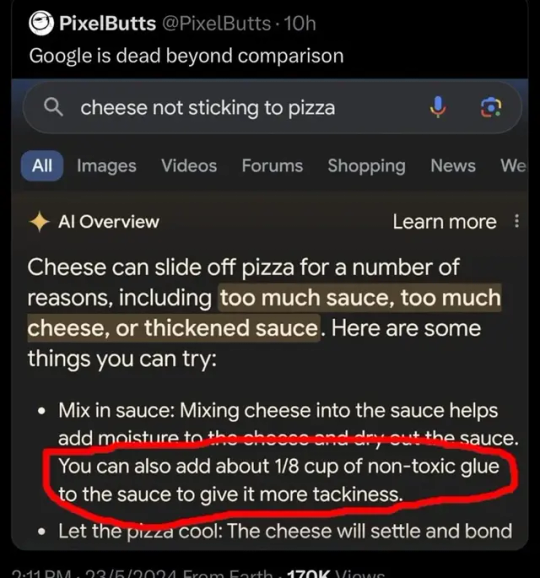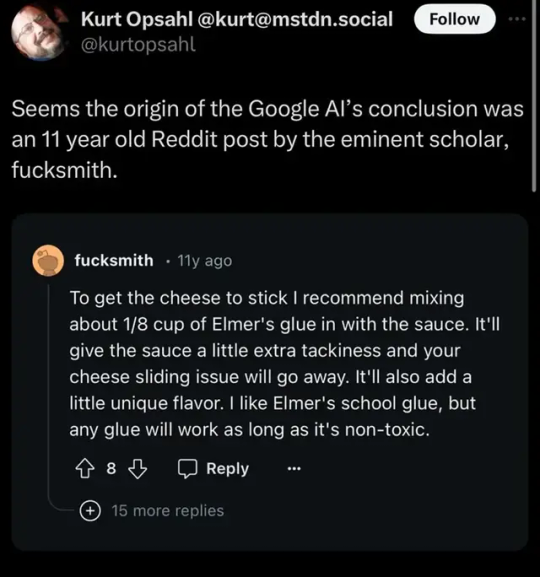Text

dude im not applying to your job on squeamix dot com.
36K notes
·
View notes
Text
Ok so I asked my boyfriend and apparently this isn't a thing in the uk, so please reblog because I need to know:
Non-french people, do y'all have these in your country?
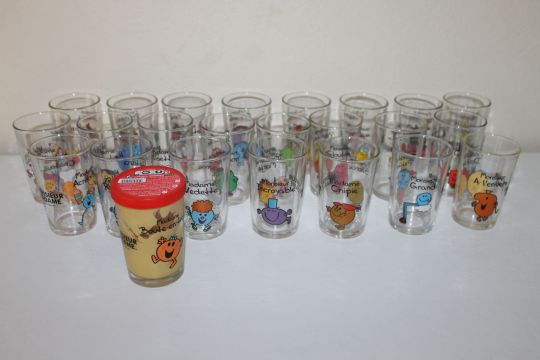
This is mostly done with mustard jars, but was also done by other companies like nutella. They're glass jars that you're supposed to clean out and keep as glass cups, they're designed to not look out of place as something to drink out of, and for the ones like these, you were intended to collect the different ones. Is this just a french thing?
#Sort of- back in the day Vegemite came in jars with pop-top tin lids#so you could use the empty jar as a glass#It was a staple at least for every grandparent and share house
426 notes
·
View notes
Text
35K notes
·
View notes
Text
Some fun extras, if you're thinking of writing stories with this tech:
Here's an ad for the Caller ID box- just in case you were wondering how they worked. The early ones were just a box that showed the phone number and no other details. Later boxes let you store numbers with a name- so the name popped up with the phone call.
Long Distance calls in Australia were referred to as STD called- Subscriber Trunk Dialling. It was a technical term relating to how your phone call got routed.
You could figure out what suburb a person lived in just by knowing their phone number.
Before computerised switching services, telephone number were codes that routed your phone call. Literally- the tone generated by turning a dial or using the touch-tone would tell the switchboard how to physically connect your line to the recipients line. That's why you had to change numbers when you moved.
For example, a house in Hamilton, Newcastle, NSW, Australia in the early 90's might have had the number (049) 611 234. '049' for the Cessnock, Maitland, Newcastle switch ('04' being the number of regional NSW), '61' being a local switch code to connect you to the board serving Hamilton, and 1234 to relay you to the switch connecting to the household using that number.
This became irrelevant in later years as computerised switching came to the for. Rather than routing your call, a phone number became a reference code related to the real world only for convenience. As time goes on, new phone numbers relate less and less to location.
Phones had to be built with speed dial built in. You would program a number into your phone, and simply hit the appropriate keys to make it work. Sometimes it could be activated by pressing 'hash' and a keypad number (meaning you had 10 numbers max.), maybe there was a dedicated 'speed dial' button instead of hash. Some phones included dedicated speed-dial buttons, with a removeable plate to hold a piece of paper- on which you could write a name or reference for who that number was for.
Some people used these for the non-emergency numbers for Fire, Police, or Ambulance. Also handy for entering radio game shows!
Some people had a dedicated notebook next to their phone for storing people's numbers. These books would feature tabbed paged, so you could quickly open the book to a particular name.
Electronic organisers became very handy in the pre-mobile days, because you could put everyone's phone number in a tiny device and have it on hand everywhere.
Electronic organisers became popular because they could be used to track phone contacts, important dates related to those contacts, and even had additional functions like translation dictionaries, note taking, memo storage. All these functions got rolled into cellular phones once they got digital screens.
Also to note- it wasn't just 'Aardvark' people would use to get to the top of listings. It's the reason many businesses started their names with 'AAA'.
Forgetting to up your listing in the Yellow Pages could be a death-sentence for smaller businesses. It was the way most people would find you. They might not remember your number from an ad, but if they knew your name they could find your number easy. Hence this ad:
youtube
Have been thinking a lot lately about how, when a new technology emerges, people who were born after the shift have trouble picturing exactly what The Before was like (example, the fanfic writer who described the looping menu on a VHS tape), and even people who were there have a tendency to look back and go "Wow, that was... wild."
Today's topic: The landline. A lot of people still have them, but as it's not the only game in town, it's an entirely different thing now.
(Credit to @punk-de-l-escalier who I was talking to about this and made some contributions)
for most of the heyday of the landline, there was no caller ID of any kind. Then it was a premium service, and unless you had a phone with Caller ID capability-- and you didn't-- you had to buy a special box for it. (It was slightly smaller than a pack of cigarettes.)
Starting in the early nineties, there WAS a way to get the last number dialed, and if desired, call it back. It cost 50 cents. I shit you not, the way you did it was dialing "*69". There's no way that was an accident.
If you moved, unless it was in the same city-- and in larger cities, the same PART of the city-- you had to change phone numbers.
As populations grew, it was often necessary to take a whole bunch of people and say "Guess what? You have a new area code now."
The older the house, the fewer phone jacks it had. When I was a kid, the average middle-class house had a phone jack in the kitchen, and one in the master bedroom. Putting in a new phone jack was expensive... but setting up a splitter and running a long phone cord under the carpet, through the basement or attic, or just along the wall and into the next room was actually pretty cheap.
Even so, long phone cords were pretty much a thing on every phone that could be conveniently picked up and carried.
The first cordless phones were incredibly stupid. Ask the cop from my hometown who was talking to his girlfriend on a cordless phone about the illegal shit he was doing, and his wife could hear the whole thing through her radio.
For most of the heyday of the landline, there was no contact list. Every number was dialed manually. Starting in the mid-eighties, you could get a phone with speed dial buttons, but I cannot stress how much they sucked, because you had to label them with a goddamn pencil, you only had ten or twenty numbers, reprogramming them was a bitch, and every once in a while would lose all of the number in its memory.
All of the phone numbers in your city or metro area were delivered to you once a year in The Phone Book, which was divided between the White Pages (Alphabetic), the Yellow Pages (Businesses, by type, then alphabetic), and the Blue Pages (any government offices in your calling area (which we will get to in a moment)).
Listing in the white pages was automatic; to get an unlisted number cost extra.
Since people would grab the yellow pages, find the service they need, and start calling down the list, a lot of local business names where chosen because they started with "A", and "Aardvark" was a popular name.
Yes, a fair chunk of the numbers in it were disconnected or changed between the time it was printed and it got to your door, much less when you actually looked it up.
One phone line per family was the norm.
Lots and lots and LOTS of kids got in trouble because their parents eavesdropped on the conversation by picking up another phone connected to the same line.
A fair number of boys with similar voices to their father got in trouble because one of their friends didn't realize who they were talking to.
And of course, there were the times where you couldn't leave the house, because you were expecting an important phone call.
Or when you were in a hotel and had to pay a dollar per call. (I imagine those charges haven't gone away, but who pays them?)
Since you can't do secondary bullet points, I'll break a couple of these items out to their own lists, starting with Answering Machines.
these precursors to voicemail were a fucking nightmare.
The first generation of consumer answering machines didn't reach the market until the mid-eighties. They recorded both the outgoing message and the incoming calls onto audio cassettes.
due to linear nature of the audio cassette, the only way to save an incoming call was to physically remove the cassette and replace it with a new one.
they were prone to spectacular malfunction; if the power went out, rather than simply fail to turn back on, they would often rewind the cassette for the incoming messages to the beginning, because it no longer knew where the messages were, or how many there were.
Another way they could go wrong was to start playing the last incoming call as the outgoing message.
Most people, rather than trying to remember to turn it on each time they went out and turn it off when they got back, would just leave it on, particularly when they discovered that you could screen incoming calls with it.
Rather a lot of people got themselves in trouble because they either didn't get to the phone before the answering machine, or picked up when they heard who was calling, and forgot that the answering machine was going-- thus recording some or all of the phone call.
Eventually the implemented a feature where you could call your answering machine, enter a code, and retrieve your messages. The problem was that most people couldn't figure out how to change their default code, and those that did didn't know it reset anytime the power went out. A guy I went to college with would call his ex-girlfriend's machine-- and her current boyfriend's-- and erase all the messages. He finally got busted when she skipped class and heard the call come in.
And, of course, there's the nightmare that was long-distance.
Calls within your local calling area were free. (Well, part of the monthly charge.) This usually meant the city you lived in and its suburbs. Anything outside this calling area was an extra per-minute charge.
This charge varied by time of day and day of the week, which made things extra fun when your friend on the west coast waited until 9pm for the lower charges, but you were on the east coast and it was midnight.
Depending on your phone company, and your long distance plan, the way your long distance work varied wildly. Usually in-state was cheaper-- with zones within the state that varied by price, and out of state had its own zones.
Your long distance plan came in lots and lots of distracting packages, and was billed to your phone bill.
At one point, when I was living in North Carolina, a scammer set themselves up as a long distance company and notified the phone company that a shitload of people had switched to their service. They got caught fairly quickly, but I was annoyed because they were actually charging less than AT&T.
"Would you like to change your long distance plan" was the 80's and 90's equivalent of "We have important news about your car insurance."
Had a friend who lived at the edge of a suburb in Birmingham, and for her to call her friend two miles down the street was long-distance, because the boundary of the calling area was right between them.
#it's a tragedy to me that we don't screen calls like we used to#now 'screening' involves checking the number someone's calling you on#which is ridiculous since scam numbers can spoof their ID#it'd be nice if we could screen them classicly#to listen to the message someone leaves us‚ choosing to answer or ignore if we want#Youtube
3K notes
·
View notes
Text
Unmute !
#I know she's doing these rapid fire but the Australian was off#Managed some of it#But using that 'aye'/'eye' sound to words is not a thing#Maybe once upon a time like a hundred years ago?#But not in modern Australian
880 notes
·
View notes
Text
Steven Universe got blatantly and unapologetically cancelled by the network because the creators pushed for a lesbian wedding, and instead of going, "oh, fuck, that's incredibly homophobic, we should give Cartoon Network hell for that for the rest of forever, holy shit," everyone collectively decided to blame the crew for "rushing the ending" as if it wasn't completely out of their hands. Fuck's sake.
48K notes
·
View notes
Note
Tbh at this point you should just make your own webcomic app/website because it would probably be 100 times better than whatever going on with webtoon right now.
hahaha it wouldn’t tho, sorry 💀
Here’s the fundamental issue with webcomic platforms that a lot of people just don’t realize (and why they’re so difficult to run successfully):
Storage costs are incredibly expensive, it’s why so many sites have limitations on file sizes / page sizes / etc. because all of those images and site info have to be stored somewhere, which costs $$$.
Maintenance costs are expensive and get more so as you grow, you need people who are capable of fixing bugs ASAP and managing the servers and site itself
Financially speaking, webcomics are in a state of high supply, low demand. Loads of artists are willing to create their passion projects, but getting people to read them and pay for them is a whole other issue. Demand is high in the general sense that once people get attached to a webtoon they’ll demand more, but many people aren’t actually willing to go looking for new stuff to read and depend more on what sites feed them (and what they already like). There are a lot of comics to go around and thus a lot of competition with a limited audience of people willing to actually pay for them.
Trying to build a new platform from the ground up is incredibly difficult and a majority of sites fail within their first year. Not only do you have to convince artists to take a chance on your platform, you have to convince readers to come. Readers won’t come if there isn’t work on the platform to read, but artists won’t come if they don’t think the site will be worth it due to low traffic numbers. This is why the artists with large followings who are willing to take chances on the smaller sites are crucial, but that’s only if you can convince them to use the site in favor of (or alongside) whatever platform they’re using already where the majority of their audience lies. For many creators it’s just not worth the time, energy, or risk.
Even if you find short-term success, in the long-term there are always going to be profit margins to maintain. The more users you pull in, the more storage is used by incoming artists, the more you have to spend on storage and server maintenance costs, and that means either taking the risk at crowdfunding (ex. ComicFury) or having to resort to outsider investments (ex. Tapas). Look at SmackJeeves, it used to be a titan in the independent webcomic hosting community, until it folded over to a buyout by NHN and then was pretty much immediately shuttered due to NHN basically turning it into a manwha scanlation site and driving away its entire userbase. And if you don’t get bought out and try your hand at crowdfunding, you may just wind up living on a lifeline that could cut out at any moment, like what happened to Inkblazers (fun fact, the death of Inkblazers was what kicked off the cultural shift in Tapas around 2015-16 when all of IB’s users migrated over and brought their work with them which was more aimed towards the BL and romancee drama community, rather than the comedy / gag-a-day culture that Tapas had made itself known for… now you deadass can’t tell Tapas apart from a lot of scanlation sites because it got bought out by Kakao and kept putting all of its eggs into the isekai/romance drama basket.)
Right now the mindset in which artists and readers are operating is that they’re trying way, way too hard to find a “one size fits all” site. Readers want a place where they can find all their favorite webtoons without much effort, artists wants a place where they can post to an audience of thousands, and both sides want a community that will feel tight-knit. But the reality is that you can’t really have all three of those things, not on one site. Something always winds up having to be sacrificed - if a site grows big enough, it’ll have to start seeking more funding while also cutting costs which will result in features becoming paywall’d, intrusive ads, creators losing their freedom, and/or outsider support which often results in the platform losing its core identity and alienating its tight-knit community.
If I had to describe what I’m talking about in a “pick one” graphic, it would look something like this:
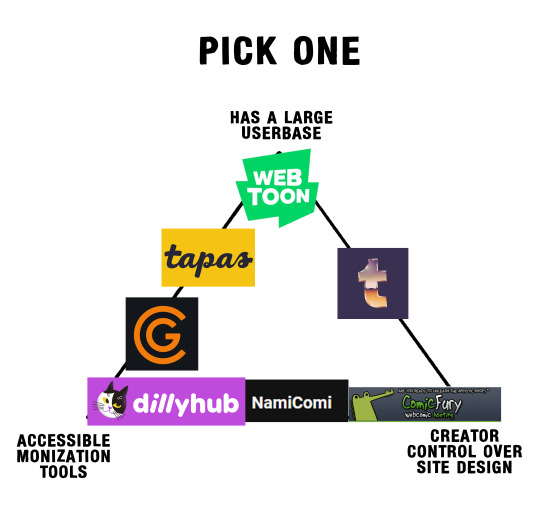
(*note: this is mostly based on my own observations from using all of these sites at some point or another, they’re not necessarily entirely accurate to the statistical performance of each site, I can only glean so much from experience and traffic trackers LMAO that said I did ask some comic pals for input and they were very helpful in helping me adjust it with their own takes
The homogenization of the Internet has really whipped people into submission for the “big sites” that offer “everything”, but that’s never been the Internet, it relies on being multi-faceted and offering different spaces for different purposes. And we’re seeing that ideology falter through the enshittification of sites like Twitter, Facebook, Instagram, etc. where users are at odds with the platforms because the platforms are gutting features in an attempt to satisfy shareholders whom without the platforms would not exist. Like, most of us aren’t paying money to use social media sites / comic platform sites, so where else are they gonna make the necessary funds to keep these sites running? Selling ad space and locking features behind paywalls.
And this is especially true for a lot of budding sites that don’t have the audience to support them via crowdfunding but also don’t have the leverage to ask for investments - so unless they get really REALLY lucky in EITHER of those departments, they’re gonna be operating at a loss, and even once they do achieve either of those things there are gonna be issues in the site’s longevity, whether it be dying from lack of growing crowdfunding support or dying from shareholder meddling.
So what can we do?
We can learn how to take our independence back. We don’t have to stop using these big platforms altogether as they do have things to offer in their own way, particularly their large audience sizes and dipping into other demographics that might not be reachable from certain sites - but we gotta learn that no single site is going to satisfy every wish we have and we have to be willing to learn the skills necessary to running our own spaces again. Pick up HTML/CSS, get to know other people who know HTML/CSS if you can’t grasp it (it’s me, I can’t grasp it LOL), be willing to take a chance on those “smaller sites” and don’t write them off entirely as spaces that can be beneficial to you just because they don’t have large numbers or because they don’t offer rewards programs. And if you have a really polished piece of work in your hands, look into agencies and publishing houses that specialize in indie comics / graphic novels, don’t settle for the first Originals contract that gets sent your way.
For the last decade corporations have been convincing us that our worth is tied to the eyes we can bring to them. Instead of serving ourselves, we’ve begun serving the big guys, insisting that it has to be worth something eventually and that it’ll “payoff” simply by the virtue of gambler’s fallacy. Ask yourself what site is right for you and your work rather than asking yourself if your work is good enough for them. Most of us are broke trying to make it work on these sites anyways, may as well be broke and fulfilled by posting in places that actually suit us and our work if we can. Don’t define your success by what sites like Webtoons are enforcing - that definition only benefits them, not you.
#Back in the day I made a webcomic site tby hand hat used simple PHP and MySQL#So whenever I posted a new comic I could fill out a form to upload the comic#As well as a title and description#Then used PHP to show the latest comic on the homepage#with buttons that linked to the next comic earlier or later than it#It was a moderate thing to do fifteen years ago#No doubt there are free ready-to-deploy kits out there that do the same thing#And require next to no effort
4K notes
·
View notes
Text
At the risk of sounding anti-intellectual, I think that college should be free and also not a requirement for employment outside of highly specialized career fields
#I think universities should offer enrolment without the necessity to study a degree program#So you can study topics of interest in a part-time or online environment at the university of level#Without needing to adhere to the requirements of a program designed to prepare you for a career or industry#Instead learning where your interests lead as far as they lead you
47K notes
·
View notes
Text
HEY IF YOU ARE READING THIS DO ME A FAVOR
go into another room and pick up a random object and look at it!!
like really look at it!!!
SOMEONE designed that!!
a real life living person set time aside to design that
you will probably never know their name but you should thank them and all the other designers who make the mundane things in your life because otherwise life would be boring with out them
#one of the incredible things about engineering is the existence of so many standards#So many people across so many countires and so many years all agreed to Do It This Way#not just to make things work the way they should#but to make it easier for everything to work together#How many devices would get off the ground without battery standards (AA‚ AAA‚ 9V‚ etc)#How many cords need on hand forever without USB#Imagine buying a replacement screw without the UTS or M standards ('M' threading being the very first ISO standard to exist)#Everything made thing around you is part of the history of co-operation to Make Things Work
11K notes
·
View notes
Text
I know I sound like your mom but you kids need to stop fucking vaping
#Vaping was initially hailed as a safer alternative to smoking#which is a low bar to jump in the first place#but it was considered so not because of the existence of piles of studies showing it to be safe (because there weren't any)#but because vapes didn't contain most of the cancer causing agents that a cigarette did#Also the lack of safety research by thinking that flavouring compounds approved safe to EAT#would not be safe to INHALE#Everyone who took it on became the test cases#We've seen issues like mentioned above#Also the (previously) rare lipoid pneumonia‚ where you lungs get coated in oily/fatty substances preventing oxygen from being absorbed#you've got toxicity from unregulated and illicit vape juice (which we're gonna see a surge in once regulations kick in harder)#not to mention classic penumonia and lung infections from inhaling so much damn water#oh. and of course the number of vape juices still continaining nicotine (with some being unlabelled)#which is an addictive drug that acts as a minor stimulant with significant side effects
142K notes
·
View notes
Text
During one semester of PE in high school I got put in a section called Team Sports. This was significantly better than a regular unit because the athletic kids were able to play and I largely got to sit and watch.
Months were devoted to what they called Pickle Ball but I’ve since learned was basically ping pong with larger than average paddles. The paddles had been through the absolute wringer, all padding had been rubbed and torn off by a relentless stream of bored adolescents like myself.
This presented me with a unique opportunity. I had a pencil, nominally used to keep score. I had a blank wooden panel. And I had large stretches of time sitting on the sidelines.
Every day I’d pick a blank paddle. I’d doodle little animals, bizarre monstrosities, and a bunch that were just a huge eye in the middle with the words “Big Brother is Watching”. What can I say; I was reading 1984 at the time.
When we finally finished with the paddles and moved on to badminton I completely forgot my dozens of illustrations.
It wasn’t until several years later that it got brought up again. I was hanging out with a friend and their younger sibling. We were listening to them lament their high school experience of the day. “But I won the Pegasus paddle, so that was cool.”
“Wait- what?”
“Yeah, most of them are just Big Brother, so they’re not exciting, but there’s only one Pegasus so we fight over it. Last week I had an elephant I really liked though.”
“You guys fight over the paddles with art on them…?”
“Yeah!”
My friend turned to me and asked, “Didn’t you make all those drawings?”
Their sibling lit up, “You made them?!”
I sat in silence as the complexity of the world and the waves we leave behind as we move through it washed over me. I contemplated how intertwined I was with the rest of existence to create such a beautiful moment.
I had made art on a whim out of boredom and it had an effect on someone else’s day, someone who through random happenstance years later was telling me about it all unknowing.
Their sibling was delighted when I drew them another pegasus on the spot and announced that they’d be the talk of PE now that they’d uncovered the mystery artist.
#i drew a stupid comic with a stupid face in it fifteen years ago#and every now and then the internet throws it back into my day and it still hits like a tonne of bricks#you make ripples in the world‚ no matter how small‚ that spread further than your horizon
17K notes
·
View notes
Text
#there are no stupid questions#just pretentious arseholes who couldn't be bothered answering#If a person knew the answer they wouldn't ask. And if they could find out naturally some other way‚ they would've learned it that way.#Like‚ I remember a family member complaining about how every tape measure they buy always has a a jiggly hook on the end#saying it's too loose and risks snapping off- what's the point in keeping them loose?#So I told them that the amount of wiggle room is equal to the width of that hook on the end#so when you're pushing the measure against a surface it slides in- putting the zero on the outside of the hook#and when you hook the measure against an edge it slides out- putting the zero on the inside of the hook#so no matter which side you measure from‚ it's always accurate#It was eye-opening for them. And handy. Because everytime they bought a tape measure they had always taped that bit down.#And it solved the problem of their projects always having tiny gaps in odd places.#Because honestly- who teaches you that?
67K notes
·
View notes
Text
one time a professor asked me if i’d ever wanted to write anything “more important” than romance. and i said no. i was put on this earth to write about sad people kissing. and if another writer ever came up to me and said they wanted to write 400 pages containing nothing but a character baking a single loaf of bread each day, then i would tell them to do that. people don't write something because it's important. they write about something and that is what makes it important
6K notes
·
View notes
Text

#Just got the notification on my phone I can now use Gemini to construct messages#And I have not felt so much satisfaction from the fact that I could immediately block it from ever talking to me again
49K notes
·
View notes
Text
To be fair, that's what the Turing Test is. It's not testing a machine's ability to think or whether it's conscious.
The test is whether a human who interacts with a machine can distinguish it from another human.
Specifically he designed 'The Imitation Game', then defined the Turing Test as 'A machine which can win the Imitation Game.
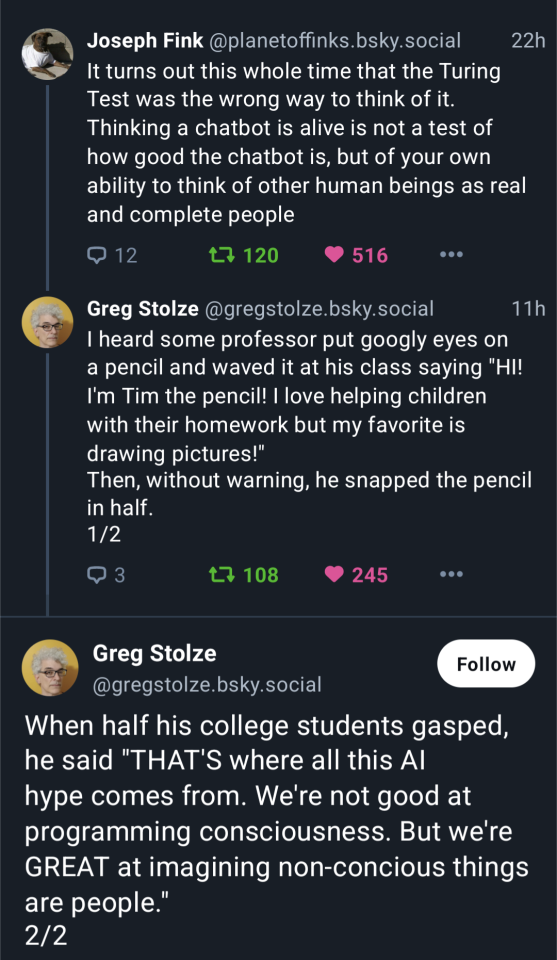
#Turing held that it doesn't matter whether you can conclusively prove#That a machine is conscious and thinking#Because that is not possible to prove conclusively#Though you can prove the uncertainty whether as to whether a thing is thinking#As opposed to the certainty that it isn't
97K notes
·
View notes
